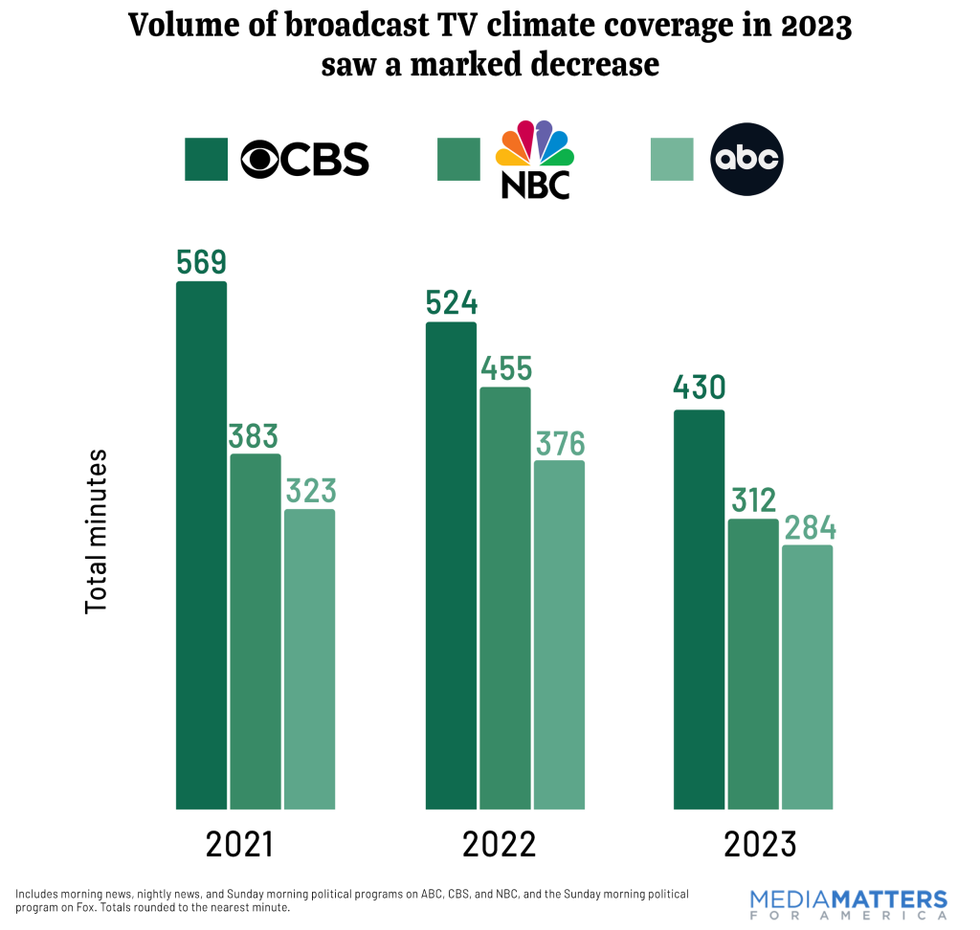Last year featured not only what scientists worldwide confirmed was the hottest year in human history but also a 25% drop in corporate broadcast networks' coverage of the fossil fuel-driven climate emergency, according to an analysis released Thursday.
Media Matters for America, which has long tracked television networks' climate coverage, reviewed transcripts and video databases for ABC, CBS, NBC, and Fox Broadcasting Co. The watchdog found that in 2023, despite the worsening global crisis, the networks collectively had just 1,032 minutes of coverage, down from 1,374 minutes in 2022 and 1,316 minutes in 2021.
That amounts to less than 1% of all corporate broadcast coverage aired last year, notes the analysis authored by Media Matters senior writer Evlondo Cooper with contributions from Allison Fisher, director of the group's climate and energy program.
"Last year's extreme climate events further illustrated the need for consistent, substantive, and wide-ranging news coverage about all facets of climate change."
They wrote that "discussion of extreme weather events aired during 37% of coverage, or 160 out of 435 segments. June through September saw the most severe extreme weather events and accounted for just over 54% of total coverage."
"Only 12% of climate segments on corporate broadcast news, or 52 out of 435, mentioned 'fossil fuels,'" the pair pointed out. "This is a slight increase from 2022, when 'fossil fuels' were mentioned in only 8% of climate segments."
"Solutions or actions that may be taken in response to climate change were mentioned in 22% of climate segments," they highlighted. That ended an upward trend: 29% in 2020, 31% in 2021, and 35% in 2022.
Cooper and Fisher also noted that climate scientists made up 10% of featured guests, compared with just 4% in 2022; "white men dominated the demographics of guests featured in climate segments" for the seventh year straight; and discussions of climate justice appeared in only 5% of coverage, up from 3% the previous year.

Looking at only the "Big Three" of the television world—ABC, CBS, and NBC—they found that climate coverage dropped 23% for morning news programs and 36% for nightly shows. CBS aired 42% of all climate coverage while ABC had the least of the trio and NBC had the biggest decrease from 2022.
For the review of Sunday morning political shows, the researchers included Fox. They found that in 102 combined minutes of airtime across 26 segments, CBS again led the pack—it was the only network that increased coverage, from 20 minutes in 2022 to 66 minutes, or over half the total, in 2023.
The analysis recognizes a "significant decline" in coverage of the Biden administration's efforts to combat the climate emergency, explaining:
This reduction in corporate broadcast news attention occurred during a critical period for climate policy implementation, particularly of the Inflation Reduction Act, which continued to drive positive outcomes in the clean energy market, and new regulations announced during COP28 to curb methane emissions. Despite these significant actions, corporate broadcast networks' focus on the administration's climate initiatives was limited.
COP28, the United Nations' annual climate summit near the end of the year, also received "very limited" coverage from the networks, the report says. The conference—which scientists called "a tragedy for the planet" because its final agreement didn't demand a global fossil fuel phaseout—was mentioned in just 14 segments, accounting for 3% of climate coverage.
As Common Dreams has reported, the National Oceanic and Atmospheric Administration found that in addition to being the hottest year on record, 2023 also had 28 U.S. disasters that caused at least $1 billion in damage, which collectively cost at least $92.9 billion.
"Last year's extreme climate events further illustrated the need for consistent, substantive, and wide-ranging news coverage about all facets of climate change," Cooper and Fisher wrote. "Effective reporting should incorporate a wide range of voices during coverage of extreme weather events, major climate studies, and policy decisions; when applicable, coverage should expose systemic issues that contribute to disproportionate climate impacts; and climate coverage must consistently report not only the impacts of climate change but the drivers of global warming and the solutions that move us away from fossil fuel dependence."
In a social media post promoting the new analysis, Cooper concluded that "we need more climate journalism, not less."

